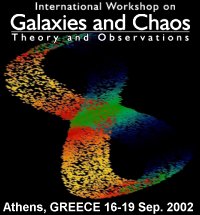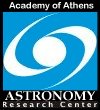|
Overview Registration
|
The Research Center for Astronomy of the Academy of Athens will host an International Workshop on "Galaxies and Chaos. Theory and Observations" in Athens, on September 2002. This workshop will gather senior scientists and young researchers with an excellent record of research. It will cover the need for a review of latest advancements in a quite modern subject which has known spectacular progress in recent years: galaxies and chaos. Galaxies are the building blocks of the Universe. Understanding the galactic structure and dynamics has been one of the greatest challenges of astronomy. A breakthrough of the last decade was the realization of the important implications of chaos in galactic dynamics. Until the late 90's there was a preference for 'integrable', or nearly integrable galactic models based on the view that most stellar bodies moved on regular orbits around the center of a galaxy. Many efforts were made to relate the resulting distribution functions to observable quantities like surface brightness profiles and/or kinematical profiles. The view that galactic systems are mostly ordered was challenged as a result of extensive theoretical and numerical studies, which have revealed the role that chaos plays in the structure and evolution of galaxies. There is now ample evidence that a significant portion of stellar orbits is in fact chaotic. It has been demonstrated that chaotic orbits can enhance rather than destroy the self-consistency of particular models of galaxies.
The new topic, galaxies and chaos, has been growing very rapidly as a result of the improvement of both observational and computational power. For example, observations in the near infrared allow us to obtain estimates of the mass distribution of the stellar components of galaxies. Thus it becomes possible to reconstruct the galactic potential and to study the resulting proportion of ordered and chaotic orbits. Another example is the study of the line of sight velocity profiles from absorption spectra of elliptical galaxies that has been used in the last decade as a test to distinguish between different models of the distribution function. The workshop will provide an overview of the recent progress made in the field of chaos in galactic dynamics. In addition, it will assess the most important new directions for research opened within the framework of joint scientific projects that are presently feasible due to the significant increase of observational and computational resources. |
| Last updated: 11 Mar 2002 Web page curator: Manolis Zoulias [ ] (Research Center for Astronomy) |



